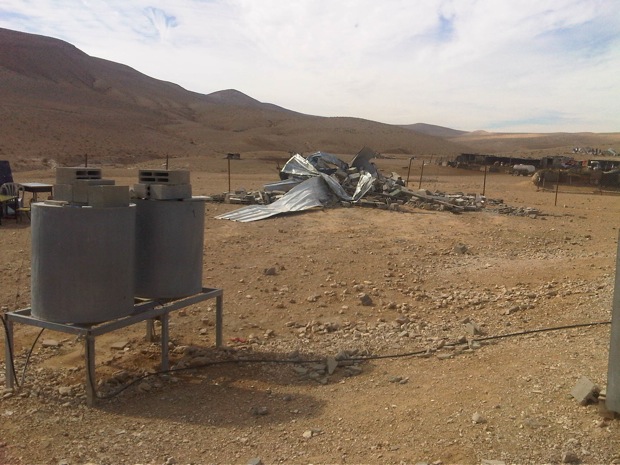The home of the Peretz family, built on the outskirts of Eli in another attempt to grab more of what even the state calls private Palestinian land, was ordered by the Justice Ministry to be demolished in 2008 – three years after the High Court was petitioned on the matter. Since then, legal battles – and especially the death of Eliraz Peretz – have slowed things down to such a crawl it now seems the house will remain standing.
In the past few days, the Peretz home has gotten considerable media coverage. Prime Minister Benjamin Netanyahu stated that he will not allow the destruction of “the homes of heroes”. And to add to the wave of anti-democratic legislation already flooding the Knesset, Likud MK Karmel Shama Hacohen (whose family name was originally just Shama, but he recently added HaCohen because people thought he might be – God forbid! – Druze) has proposed a bill that will demand any demolition of buildings in the West Bank to first be approved by the Defense and Foreign Affairs Committee – taking the decision out of the hands of the Labour-run Defense Ministry.
Oh, sorry – I forgot to mention something. The bill actually states “the demolition of buildings belonging to Israelis” in the West Bank. Yeah, I guess I shouldn’t have left that out…
Too bad for Oudah al Najada. He’ll never be considered Israeli, even though he’s been under the state’s rule for 43 years. As my colleague Mairav Zonszein reported here on +972 Magazine, 17 structures, including a school and a bathroom facility, were demolished by the army on January 12 in al-Daqeqa.
Needless to say, the demolition orders for al-Daqeqa did not proceed slowly through the bureaucratic ping-pong between government offices, High Court decisions and IDF orders for over six years. Also, there aren’t any heroes in al-Daqeqa. At least not the kind Israel thinks of as heroes. It only took a few hours for the army to leave 300 villagers to fend for themselves in the winter of the South Hebron Hills.
As Zonszein notes, the Palestinian residents in this area never had a chance to build anything legal to begin with:
“The army’s reasoning of illegal construction is not a valid argument because Israel has a policy of preventing Palestinian construction all over Area C of the West Bank and in East Jerusalem, in the interest of maintaining and increasing Jewish presence.”
For me, hearing the term Apartheid in connection to Israel has always been very difficult. Nowadays, it makes me cringe. But it didn’t always make me cringe. I used to just wave it off, like I wave off the crazies who use the Nazi references. The Nazi references make me angry, because I know they’re used only to insult me and because they’re not based on fact.
But lately, I can’t seem to wave off the Apartheid references like I still do with Nazi ones. I know now that there’s a reason I cringe. Because deep down inside, there’s a truth to it I can no longer deny. I can no longer explain the different treatment the Peretz family gets as opposed to the al-Najada family.
Today, I rule millions of Palestinians without human basic rights. The villagers of el Dakika are under my rule, just like the settlers of Eli are. The latter get water, electricity, education and other necessities. Al Dakika stands in ruins.
These people are under my rule. They are under your rule. And if you’re reading this abroad, your indifference has enabled it.
A country that has lost its moral values and has no problem with destroying the homes and amenities of 300 people has also lost its sanity. It is a country that is no longer able to choose its destiny. It is a country that needs to be told what to do by the international community.
This intervention must happen immediately. Before the time comes when we stop waving off Nazi references with ease, and instead start to cringe.


